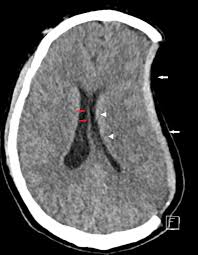 Sinking skin flap syndrome is a medical emergency that rarely complicates large craniectomy.
Sinking skin flap syndrome is a medical emergency that rarely complicates large craniectomy.
It results from an intracerebral hypotension and requires the replacement of the cranial flap.
The sinking skin flap syndrome (SSFS) or syndrome of the trephined is a rare complication that occurs in approximately 10% of large craniectomies and tends to develop several weeks to several months after surgery.
It consists of a sunken scalp above the bone defect with neurological symptoms.
The principal symptoms are severe orthostatic headache, motor deficits, cognitive decline or seizures.
The SSFS may progress to herniation and eventually lead to coma or death without treatment.
Hypothesis proposed to explain the physiopathology of this syndrome suggests a direct compression of the brain by the atmospheric pressure to the intracranial cavity through the skin scalp.
Another hypothesis proposed that the difference between atmospheric and intracranial pressure may lead to hypovolemia and/or hypopressure in the cerebrospinal fluid (CSF).
CSF drainage such as external ventriculostomies, ventriculoperitoneal shunts, or after lumbar punctures can aggravated this condition.
Craniectomy may induce significant alterations in blood flow regulation mechanisms.
All these possibility may contribute to decreased regional cerebral blood flow and metabolic changes causing cortical dysfunction and neurological deficits.
CT scan revealed a large craniectomy with concavity of the overlying skin scalp, with mass effect such as sulci effacement and midline shift in the opposite direction of the scalp, also referred to as ‘paradoxal hernia.’
The final treatment is cranioplasty with replacement of the cranial flap but surgery is often delayed for many reasons.
During this time, measures are needed to raise the intracranial pressure like Trendelenburg position, hydration and clamping of CSF drainage.
